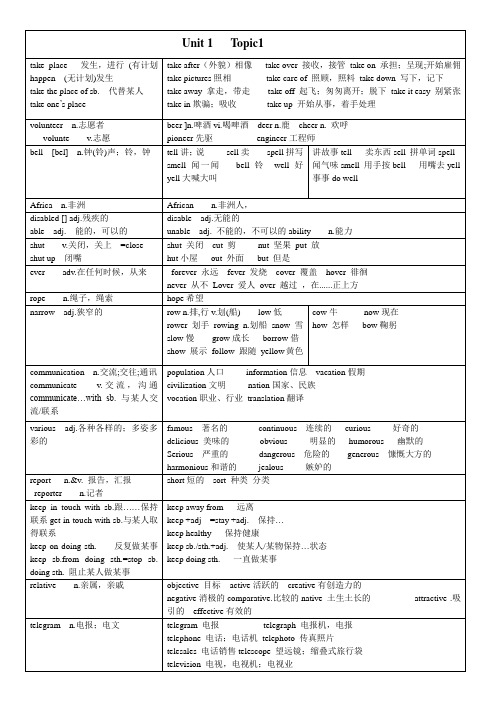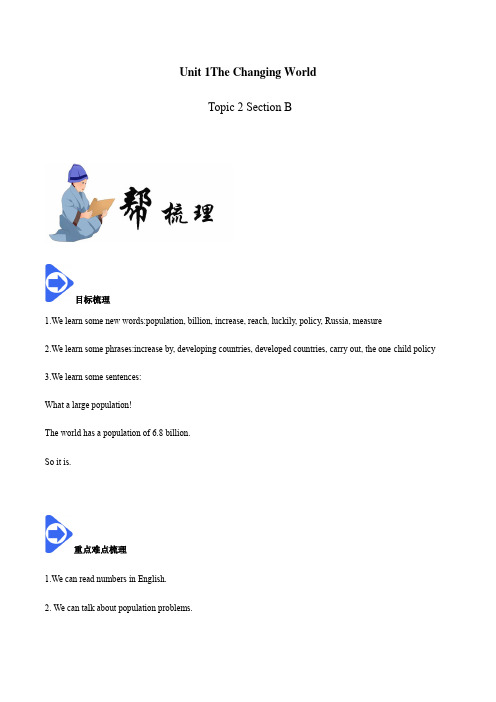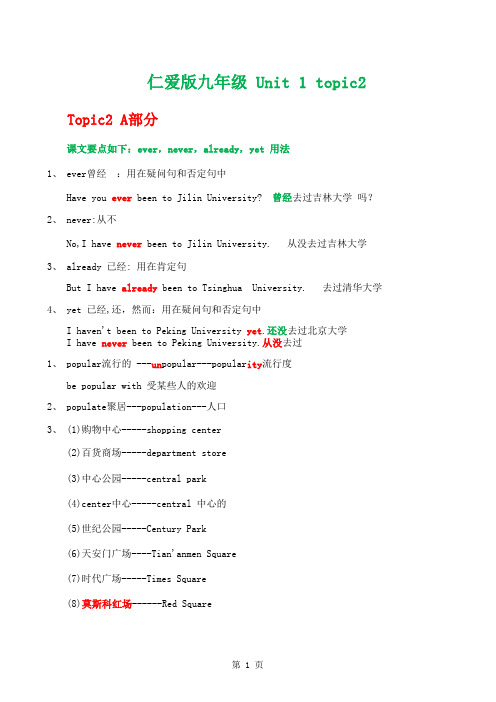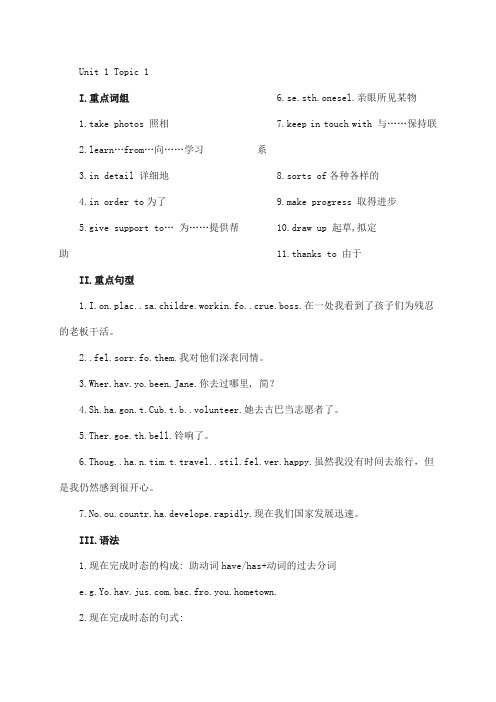九年级unit1topic2知识点及练习
仁爱英语九年级Unit 1 Topic 2 词汇整理

tell讲;说sell卖spell拼写
smell闻一闻bell铃well好yell大喊大叫
讲故事tell卖东西sell拼单词spell
闻气味smell用手按bell用嘴去yell
事事do well
Africa n.非洲
African n.非洲人,
disabled [] adj.残疾的
take away拿走,带走take off起飞;匆匆离开;脱下take it easy别紧张
take in欺骗;吸收take up开始从事,着手处理
volunteer n.志愿者
volunte v.志愿
beer ]n.啤酒vi.喝啤酒deer n.鹿cheer n.欢呼
pioneer先驱engineer工程师
washing machine洗衣机
progress n.进步;进展;v.进展;逐步发展
make progress取得进展;取得进步
probably大概,或许problem问题program节目protect保护
process过程,方法;加工produce生产,制造project计划
product制品production产量provide提供
Singapore新加坡sincere真诚的
singlish新加坡英语sincerely真诚地
reform n.改革,改良
form v.形成re-再…
reform and opening up改革开放
re表示再一次return返回remake重制
rebirth再生rebuild重建recover重新获得reform重整relive再生remind提醒remove远离reappear再现
初中英语 仁爱版九年级上册Unit1 Topic2知识点

Unit1 Topic2Section A1.get lost=be lost=lose one’s way迷路2.---I hate going to the supermarket. ---So do I.---我讨厌去超市。
---我也是。
---He is a good student. ---So is she .---他是一个好学生。
---她也是。
---They must come. ---So must I. ---他们必须来。
---我也必须。
---He has finished the task. ---So have they.---他已经完成了这项任务。
---他们也是。
so + be动词/情态动词/助动词+主语(肯定句):表示前面提到的肯定情况也同样适合另外一个人或物,翻译成:...也...---Rita is not a lazy girl. ---Neither am I. ---丽塔不是一个懒惰的女孩。
---我也不是。
---My granny can’t carry the box. ---Neither can I .---我的奶奶搬不动这个箱子。
---我也不行。
---Tom has never been there. ---Neither have I. ---汤姆从没去过那儿。
---我也没有。
Neither / Nor + be动词/情态动词/助动词+主语(否定句):表示前面提到的否定情况也同样适合另外一个人或物,翻译成:...也不...3.与现在完成时连用的时间状语:already用于肯定陈述句;never用于陈述句,表否定;ever用于疑问句,翻译为“曾经”;yet用于否定句,表示“还(没),尚未”,疑问句表示“已经”;just用于各种句式,位于动词前;before用于各种句式,位于句末。
4.练习:(1)— Lucy dances very well. — ____________A. So Lily is.B. So Lily does.C. So is Lily.D. So does Lily.(2)— Mr. Zhang is not good at singing .— ____________A. Neither is she.B. So does she.C. So is she.D. Neither does she.(3)— Have you returned the book _______?— Yes, I’ve _______ returned it.A. already, alreadyB. yet, yetC. yet, justD. just, already(4)Jim, Maria _______ just now, but you were not at home.A. called up youB. called you upC. calls up youD. calls you up (5)— I find it very important to learn English well. — _______.A. So I amB. So do IC. So I doD. So am I(6)China is _______ that my mother likes it very much.A. such beautiful a countryB. so a beautiful countryC. such a country beautifulD. such a beautiful countrySection B1.Population人口,人口数。
九年级英语仁爱版上册Unit1_Topic2_SectionB_同步课堂帮帮帮

Unit 1The Changing WorldTopic 2 Section B目标梳理1.We learn some new words:population, billion, increase, reach, luckily, policy, Russia, measure2.We learn some phrases:increase by, developing countries, developed countries, carry out, the one-child policy3.We learn some sentences:What a large population!The world has a population of 6.8 billion.So it is.重点难点梳理1.We can read numbers in English.2. We can talk about population problems.知识梳理【1】What a large population!这么多人口!population人口,人口数量。
描述人口多寡时通常用large或small.population作主语时,谓语动词用单数或复数都可以。
have/has a population of...有……人口e.g.One third of the world's population consumes/consume two thirds of the world's resources.世界上三分之一的人口消耗着全球三分之二的资源。
e.g.What's the population of China?中国的人口是多少?【2】And it is increasing by 90 million every year.而且世界人口每年增加九千万。
increase by...增加了·…,by表示增长幅度,其后常跟百分数。
仁爱英语九上unit1topic2课文及总结笔记

仁爱英语九上unit1topic2课文及总结笔记一、课文概述仁爱英语九上Unit1 Topic2的课文以一个日常生活中的场景为背景,讲述了一段关于友谊的故事。
故事中,主人公Tom和他的朋友Jim在一次偶然的机会下结识了来自不同国家的新朋友。
在这个过程中,他们相互了解、交流,分享了各自的文化,最终成为了更好的朋友。
二、重点词汇和短语1.生词解释- diverse:不同的,多样的- customs:习俗,风俗- exchange:交换- communication:交流2.实用短语- Make friends with:与……交朋友- Share ideas:分享想法- Learn about:了解- Respect each other:互相尊重三、语法解析1.一般现在时一般现在时用于描述经常发生或习惯性的动作。
在本课文中,一般现在时用来描述主人公们之间的友谊以及他们如何相互交流。
2.一般过去时一般过去时用于描述过去发生的动作。
在本课文中,一般过去时用来回忆主人公们是如何结识新朋友的。
3.句子结构本课文中的句子结构多样,有简单句和复合句。
通过学习这些句子,学生可以了解到不同句子的构成以及如何运用恰当的时态。
四、实用对话1.对话内容课文中的对话发生在Tom和Jim与他们的外国朋友之间。
他们在对话中分享了各自国家的文化习俗,以及如何尊重和理解不同的文化。
2.口语技巧在这段对话中,学生可以学习到如何用英语礼貌地提问、回答问题,以及如何表达自己对不同文化的兴趣和尊重。
五、课后练习解答1.问题解答课后练习中的问题主要围绕课文内容、词汇和语法展开。
例如:“请描述Tom和Jim是如何结识新朋友的。
”、“请解释以下句子的时态:‘They often communicate with each other.’”等。
2.解题思路解答这些问题时,需要对课文内容、词汇和语法有充分的了解。
对于描述性问题,要结合课文中的情节进行回答;对于语法性问题,要明确句子所使用的时态并根据题意进行解答。
仁爱版九年级上册英语Unit1Topic2知识点

Unit 1 Topic 2Sectio n A探短语集锦1. get ost= be lost 迷路;走丢eg: We got lost and could nt fin d'ach other.(同义句)=We were lost and couldntfind each other.2. bad luck!真倒霉!3. call sb up = ring sb up = give sb a call 给某人打电话4. so do I我也一样5. It seems that…=…seem to do 似乎;好像…eg::1) It seemed that Mr. Gree n was a teacher two years ago.(同义句)=Mr. Gree n seemed to be a teacher two years ago.2)It seems that their living conditions were not very good.(同义句)=Their living conditions didn 'seem to be very good.2)He seems to know the secret.(同义句)=It seems that he knows the secret.6. at least 至少at most最多;充其量7. 形容人口多用large来表达,形容人口少用smalleg : a large population / a small population 人口众多/ 人口稀少注意:对人口的数量提问用Whateg: 1) The populatio n of China is over 1.3 billi on.(提问)What's the populati on of China?2) The populati on of In dia is over 1.1 billi on.(提问)What's the populati on of In dia?注意:1)What' s the population of Chi na(同义句)= How large is the populati on of China?2) What's the population of India?(同义句)=How large is the populati on of In dia?8. take place 发生(确定性)happen发生(偶然性)eg: 1) The weddi ng will take place in September.2) A big traffic accident happened to Jim last week.与happen相关的两个短语:1)s th happen to sb某事发生在某人身上2)h appen to sth碰巧做某事eg: 1) A fire accide nt happe ned to Kang Kang last ni ght.1) Lily happe ned to meet her En glish teacher in the park last Sun day.9. because of…由于;因为10. one-child policy:独生子女政策11. used to do sth过去常常做某事be used to doing sth = get used to doing sth 习惯于做某事used to be 过去曾经是There used to be过去曾经有eg: 1) My brother used to play soccer after school.2) Mr. Gree n is used to smok ing.=Mr. Gree n gets used to smok ing.3) Miss Yang used to be a teacher.4) There used to be a bridge in front of my house.5) Lily used ______ (play) basketball in the gym.6) My sister is used to _______ (speak) English.12. in developing countries:在发展中国家In developed coun tries 在发达国家13. 在比较级中,如果比较对象相同,用that代替前面的单数;用those代替前面的复数eg: 1) The weather in Beijing is colder than ________ in Chongqing.2) The population of China is larger than _______ of India.3) The apples on the tree are redder than ______ in the basket.14. too many +可数名词复数too much +不可数名词much too + 形容词many too + 形容词eg: 1) There are too many people in the park on Sun days.2) I don 'like eat ing too much can dy.Sectio n B1. increase by 增加了….in crease to增加到了…eg: 1) Our pay has in creased by¥ 200.2) Our pay has in creased to¥ 2800.2. carry out:执行eg: 1) The policema n carried out a task just now.2) China has carried out the one-child policy to control the population.3.1) so + be助动词/情态动词+另一主语:表示前面提到的肯定情况同样适合另一主语,意为某人也如此eg::a. Jane likes Chinese , _______________________ (莉莉也如此).b. She has bee n to Shan ghai _, _______________________________ (她的弟弟也如此).2)Neither + be/情态动词/助动词+另一主语):表示前面提到过的否定情况同样适合另一主语,意为某人也不....eg: a. No one likes little emperors", ___________________ __________ .(我的父母亲也不喜欢)b. Lily didn 'go to school yesterday, __________________________ .(Jane也没去上学)c. He isn 'a teacher, _______________________ .(我也不是)3)so /neither +同一主语+ be /情态动词/助动词:表示对前面的话的确认,意为的确如此/的确不是这样eg: a. Lily likes English, _______ ___________________(的确如此).b. Li Ming doesn'study hard, ___________________________ .(的确是这样)特别提醒:1)Me, neither. = Neither +助动词/be动词/情态动词+ I2)Me, too. = so + 助动词/be动词/情态动词+ I Sectio n C1. carry out:执行;实行2. more tha n = over 超过;多余3. Live in +地点:居住在某地4. China has the largest population in the world.(同义句)=China has a larger populati on tha n any other country in the world.5. because o f 由于6. be short o:短缺…;缺乏…7. so far:到目前为止;迄今为止8. take many measures :采取措施take measures to do sth 采取措施做某事eg: 1) We should take measures __________ (protect) the environment.2) The government will take many measures ___________ (control) the populatio n.9. work well in doing sth :在…方面起作用eg: It works well in _________ (protect) our teeth.10. be known as = be famous a s 作为…而出名be known for = be famous fo:因…而出名11. have a long way to go:有一条长长的路要走12. face / solve / deal with a problem 面对/ 解决/ 处理问题Sectio n D1. less than 少于;不到与more than是一对反义词组注意:more than = over2. a couple of hours / days 几个小时/天3. unless:连词意为除非在句中引导条件状语从句.可改为if -n-oteg: 1) I won tgo to Lily ' birthday party unless I am invited. 同义句)=I won 'go to the Lily ' birthday party if I am not in vited.2) They won 'go climbi ng unl ess it is fine tomorrow.(同义句)=They won 'go climbi ng if it isn 'fi ne tomorrow.4. far away 遥远5. places of interest 名胜古迹6. keep up with = catch up with 跟上;赶上探精讲精析分数的表达分子用基数词,分母用序数词,先说分子,再说分母,分子大于1,分母要加s eg:三分之二:two thirds五分之三:three fifths二分之一:one sec ond八分之五:five eighths注意:谓语的数由分数所指的名词决定,即分数后的名词如果是复数,谓语的数就用复数,如果是不可数名词或单数名词,谓语的数就用三单形式eg 1) One third of the students _______ to go.2) Two thirds of the teachers ________ (be) men.3) One fifth of the bread ________ (go) bad.4) A quarter of the students ______ (be) girls5) Sixty perce nt of her in come (收入) ___________________ on clothes.探语法聚焦现在完成时常与下列副词(just / already / yet / ever / never /before连用just:意为刚刚置于助动词have / has之后,实义动词之前already:意为已经用于肯定句可置于句中have / has之后,也可置于句末. yet:用于否定句表示还没,尚未),用于一般疑问句时意为已经ever:意为曾经多用于一般疑问句never:意为从来不多用于陈述句表否定before:意为在以前一般置于句末用just / already / yet / ever / never /before填空A1) She knows nothing about the book because she has ___ read it.2) The early bus has _____ left. You have to wait for the next.3) ________________ _ Have they gone fishing?_ No,4) Have they finished their work _____ ?5) Has Mary ______ been to China?6) I've been there _______ and don'want to go there any more.BA: Have you ______ been to France?B: No, I "ve _______ been to any European countries, but Michael has. He says he has _______ been to such a beautiful country before.A: Have you see him ______ ?B: Yes, I have see him ________。
仁爱版九年级上册unit 1 topic 2 课文重点

仁爱版九年级 Unit 1 topic2 Topic2 A部分课文要点如下:ever,never,already,yet 用法1、ever曾经 :用在疑问句和否定句中Have you ever been to Jilin University? 曾经去过吉林大学 吗?2、never:从不No,I have never been to Jilin University. 从没去过吉林大学3、already 已经: 用在肯定句But I have already been to Tsinghua University. 去过清华大学4、yet 已经,还,然而:用在疑问句和否定句中I haven't been to Peking University yet.还没去过北京大学I have never been to Peking University.从没去过1、popular流行的 ---un popular---popular ity流行度be popular with 受某些人的欢迎2、populate聚居---population---人口3、(1)购物中心-----shopping center(2)百货商场-----department store(3)中心公园-----central park(4)center中心-----central 中心的(5)世纪公园-----Century Park(6)天安门广场----Tian'anmen Square(7)时代广场-----Times Square(8)莫斯科红场------Red Square4、我以前从未去过那儿,但我再也不想去那儿了I have never been there before,but I don't want to go there any more.not...any more 不再...not ..any longer 时间上不再继续 例:He couldn't wait any longer. 5、走失,迷路-----get lost我们走散了,找不到对方-----We got lost and couldn't find each other.我的钢笔丢了----My pen is lost=My pen is gone=My pen is mising.6、给...打电话------call sb up =ring sb up = make a phone call to sbI often call my mother up on weekends.7、倒装句:so+be+主语, 表示“....也一样”neither+be+主语, 表示“....也不”<1>He really hate going to a place like that.So ___ ___.他真的讨厌去那样的地方,我也是。
(完整版)仁爱英语九年级上册知识点归纳

Unit 1 Topic 1I.重点词组1.take photos 照相2.learn…from…向……学习3.in detail 详细地4.in order to为了5.give support to…为……提供帮助6.se.sth.onesel.亲眼所见某物7.keep in touch with 与……保持联系8.sorts of各种各样的9.make progress 取得进步10.draw up 起草,拟定11.thanks to 由于II.重点句型1.I.on.plac..sa.childre.workin.fo..crue.boss.在一处我看到了孩子们为残忍的老板干活。
2..fel.sorr.fo.them.我对他们深表同情。
3.Wher.hav.yo.been.Jane.你去过哪里, 简?4.Sh.ha.gon.t.Cub.t.b..volunteer.她去古巴当志愿者了。
5.Ther.goe.th.bell.铃响了。
6.Thoug..ha.n.tim.t.travel..stil.fel.ver.happy.虽然我没有时间去旅行,但是我仍然感到很开心。
7.No.ou.countr.ha.develope.rapidly.现在我们国家发展迅速。
III.语法1.现在完成时态的构成: 助动词have/has+动词的过去分词.bac.fro.you.hometown.2.现在完成时态的句式:e.g.(1..hav.bee.t.Moun.Huan.wit.m.parents.(2) I haven’t seen him for a long time.(3) Where have you been?(4.——Hav.yo.eve.cleane..room?.——Yes..have..No..haven’t.3.have.ha.been.have/ha.gon.的区别have/has been to sp.表示曾经到过某地—— have/has gone to sp.表示已经去了某地e.g.(1..hav.bee.t.Moun.Huan.wit.m.parents. .(2.Sh.ha.gon.t.Cub.t.b..vo lunteer.Unit 1 Topic 2I.重点词组1. get lost 迷路2. each other 彼此3.at least 至少4take place发生5because of 因为6.b.stric.wit.sb.对某人严格要求.7.carry out 实行8.be short of 缺乏9.take measures to do sth.采取措施做某事10.be known as…作为……而著名11.work well in doing…在……方面起作用12.a couple of 一些13keep up with赶上,跟上II.重点句型1.Hav.yo.foun.hi.yet.你已经找到他了吗?2.——.reall.hat.t.g.shopping.我的确讨厌购物。
仁爱英语九年级上册unit 1 topic 2 重点短语

13.one fifth of 五分之一的 14.because of +名词/短语 因为 15.so far 到目前为止(用现在完成时) 16.take measures to do sth.采取措施做某事 17.be known as= be famous as 作为…而出名 18.work well in (doing ) sth. 在某方面很有成效 19.thanks to 幸亏,由于 20.have a long way to go 有很长的路要走 21.provide sth. for sb. =provide sb. with sth. 为某人提供某物 22.less/fewer than 不到,少于 23.be surrounded by 被……环绕 24.be careful with sth. 小心谨慎对待某物 25.discourage doing sth. 阻止做某事 26.meet with sb. 与某人相约
Unit 1 Topic 2重点短语句型 1.not …any more 不再 2.get lost =lose one’s way 迷路,走失 3.bad luck 倒霉 4.call sb. up =ring sb. up 给某人打电话 5.So do I. 我也是。 rge/small population 人口多/少 7.have/ with a population of… 有……人 口 8.increase by +倍数或百分数 增加了 9.increase to 增加到 10.What’s the population of…? = How many people are there in …? ……人口是多少? 11.So it is. 的确是, 确实如此 12.carry out 实行,执行
- 1、下载文档前请自行甄别文档内容的完整性,平台不提供额外的编辑、内容补充、找答案等附加服务。
- 2、"仅部分预览"的文档,不可在线预览部分如存在完整性等问题,可反馈申请退款(可完整预览的文档不适用该条件!)。
- 3、如文档侵犯您的权益,请联系客服反馈,我们会尽快为您处理(人工客服工作时间:9:00-18:30)。
九年级unit 1 考点解析Topic 2 一、词组Section Aget lost 迷路,迷失living conditions 生活条件at that time 在那时call up 打电话给……at least 至少take place 发生because of 由于,因为one-child policy 独生子女政策be strict with 对……严格Little Emperor 小皇帝Section Bincrease by 增加了……developed countries 发达国家carry out 实施Developing countries 发展中国家population problem 人口问题control the population 人口控制Section Cmore than 多于living space 生活空间for example 例如take measures to do sth. 采取措施做某事work well in doing sth. 在…方面起明显作用improve rapidly 迅速提高one fifth 五分之一be short of 短缺,缺乏so far 到目前为止be known as作为……而闻名,被公认为……thanks to 多亏,由于have a long way to go 还有很长的路要走Section Dhelp each other 互帮互助places of interest 名胜古迹Summer Palace 颐和园shopping centers 购物中心public transportation 公共交通,公共运输quick development of modern society现代社会的快速发展a couple of 一些,少数几个such as 例如the Forbidden City 紫禁城,故宫huge markets 大超市keep up with 赶上某人,跟上某事二、语言点详解Section A1.—Have you found him yet?—No, he has probably gone home.yet adv. 意为“已经,仍然,还”,多用于完成时态的否定句和疑问句,常放在句末。
[链接] 和现在完成时连用的副词还有already, just, ever, never, recently.already多用于肯定句中,可以放在句中,也可以放在句末。
如:I have already cleaned the windows. 我已经把窗户擦干净了。
just 多用于肯定句,也可以用于疑问句。
如:The manager has just come back from the United States. 经理刚从美国回来。
ever多用于疑问句中,询问曾经的状况。
如:、Have you ever been to Hong Kong? 你曾经去过香港么?never多用于否定句。
如:He has never been to Canada. 他从没去过加拿大。
recently表示时间概念,多用于句末练一练:用just, already, yet, recently, ever, never 填空1.Have you ______ been to the West Lake?No, I have ______ been there.2.I have _______ read the novel twice.3.Have you finished your work ______?4.I haven’t heard from her ______.5.He has ______ gone shopping with his parents.2. —I really hate to go to such a place. 我真的讨厌那样的地方。
—So do I. 我也是。
So do I. 为倒装句,表示前面提到的肯定情况也同样适合另一个主体。
So 后接倒装句式,结构为“so + be/ 情态动词/助动词/主语”,意为“……也一样/也是”。
如:They like playing basketball. 他们喜欢打篮球。
So do we. 我们也喜欢。
Lily can speak English. 莉莉会说英语。
So can I. 我也会。
链接:1)如果对上文所述的事实加以认可强调,用“so+主语+be/情态动词/助动词”,表示“确实如此”。
如:He is a good student. 他是一个好学生。
So he is!他确实是这样。
Li Lei can swim. 李雷会游泳So he can. 他确实会。
2)如果表示上文提到的否定情况也同样适合另一个主体,则用“neither/nor+ be/情态动词/助动词+主语。
”如:I don’t like the weather here. Neither /Nor does she.我不喜欢这儿的天气。
她也不喜欢。
They aren’t in Class One. Neither/Nor are we.他们不在一班。
我们也不在一班。
练一练:1. Tom does well in English. So _____ I.2. She can’t play the piano well. Neither _____ Tom3. Lucy studies hard at school. So she_ _____4. She hasn’t been to China before. ______ ______ I5. He didn’t do his homework last night. ______ he _____.6.()(2011年福州市质检)1. --I came to this school two years ago!--_________.A. So did IB. So I didC. So was I7.()2. ─You have made great progress in English.─__________.A. So I do.B. So do I.C. So I haveD. So have I.3. He says he has never been to such a beautiful country before. 他说他以前从未去过如此美丽的国家。
such 与so 都有“如此”之意。
such 修饰名词,so 修饰形容词或副词原级,只有修饰可数名词单数时,可以互换。
如:such a clever boy= so clever a boy 如此聪明的一个男孩名词前出现much, many, little, few 等表数量的词时只能用so.so nice a flower= such _____ _____ __________ many/few people; ______ much/little milk______ nice flowers4. But it seems that their living conditions were not very good. 但他们的生活条件似乎不太好。
seem 系动词,表示好像,似乎,看来。
其后可接形容词、名词、动词不定式和that从句。
You seem happy. 你好像很高兴。
He seems a nice man. 他看起来像个好人。
动词不定式和that从句可互换。
如:He seems to join the school basketball team.= It seems that he joins the school basketball team.他似乎参加了学校的篮球队。
He seems to know everything.= ______ ______ that he ______ everything.5. But great changes have taken place in China in recent years. 但中国近年来发生了很大变化。
take place 发生,举行。
是不及物动词短语,尤指通过计划或安排后的变化。
通常不用于被动语态。
如:The class meeting will take place on Monday. 班会将会在星期一举行。
happen 一般表示事件偶然发生。
用法如下:1). sth + happen + 地点、时间,如:The story happened in 1998.2) sth + happen to sb,如:A car accident happened to her last week.3) sb + happen + to do sth,某人碰巧做某事,如:I happened to meet him on my way home.= It happened that I met him on my way home.练一练:1. The Olympic Games of 2008 will _____ ______ in Beijing. 2008年奥运会将会在北京举行。
2. What ______ _____ you? 你怎么了?6.I’m the only child in my family, and I used to be a “Little Emperor”. 我是我们家唯一的孩子,我过去是个“小皇帝”。
used to be 过去/曾经是……如:He used to be a teacher.used 相关用法总结如下:1) used to be (usedn’t/didn’t use to be )过去/曾经(不)是……used to do (usedn’t/didn’t use to do)过去常常(不)做某事He used to be a teacher. 他过去是个老师。
He used to have a walk after supper. 他以前常常晚饭后散步。
2) be/become/get used to doing sth 习惯于做某事He is used to getting up and going to bed early. 他习惯于早睡早起。
3) be used to dobe used for sth/ doing sth 被用来做某事。
如:A knife is used to cut things.= A knife used for cutting things. 小刀是用来切东西的。
